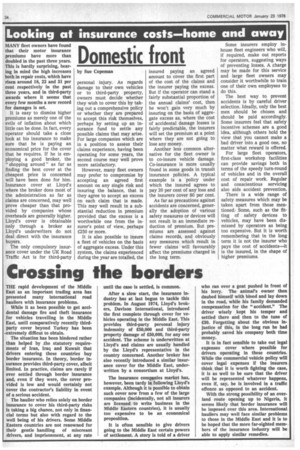Crossing the borders
Page 36

If you've noticed an error in this article please click here to report it so we can fix it.
THE rapid development of the Middle East as an important trading area has presented many international road hauliers with insurance problems.
While it as been possible to get accidental damage fire and theft insurance for vehicles travelling in the Middle East, until comparatively recently thirdparty cover beyond Turkey has been .extremely difficut to obtain.
The situation has been hindered rather than helped by the statutory requirements of Iran, Iraq and Kuwait that drivers entering these countries buy border insurance. In theory, border insurance provides third-party cover, albeit limited. In practice, claims are rarely if ever settled through border insurance and, even if they were, the cover provided is low and would certainly not cover the contractor's liability in event of a serious accident.
The haulier who relies solely on border Insurance to cover his third-party risks is taking a big chance, not only In financial terms but also with regard to the well being of his drivers. Some Middle Eastern countries are not renowned for their gentle handling of miscreant drivers, and imprisonment, at any rate until the case is settled, is common.
After a slow start, the insurance industry has at last begun to tackle this problem. In August 1974, Lloyd's brokers, Davison International, introduced the first complete through cover for vehicles operating in the Middle East. This provides third-party personal injury indemnity of £50,000 and third-party property damage of £50,000, for any one accident. The scheme is underwritten at Lloyd's and claims are usually handled by the Lloyd's representative in the country concerned. Another broker has also recently introduced a similar insurance cover for the Middle East, underwritten by a consortium at Lloyd's.
The insurance companies market has, however, been tardy in following Lloyd's example. Although it is possible to obtain such cover now from a few of the large companies (incidentally, not all insurers are licensed to write business in the Middle Eastern countries), it is usually too expensive to be an economical proposition.
It is often sensible to give drivers going to the Middle East certain powers of settlement. A story is told of a driver who ran over a goat pushed in front of his lorry. The animal's owner then daubed himself with blood and lay down in the road, while his family demanded compensation for the "accident." The driver wisely kept his temper and settled there and then to the tune of £30. Forgetting about the obvious injustice of this, in the long run he had probably saved his company both time money.
It is in fact sensible to take out legal expenses cover where possible for drivers operating in these countries. While the commercial vehicle policy will cover legal expenses if the insurers . think that it is worth fighting the case, it is as well to be sure that the driver will be represented whatever happens, even if, say, he is Involved in a traffic offence as opposed to an accident.
With the strong possibility of an overland route opening up to Nigeria, it seems likely that border insurance will be imposed over this area. International hauliers may well face similar problems to those in the Middle East and it is to be hoped that the more far-sighted members of the insurance industry will be able to apply similar remedies.
















































































